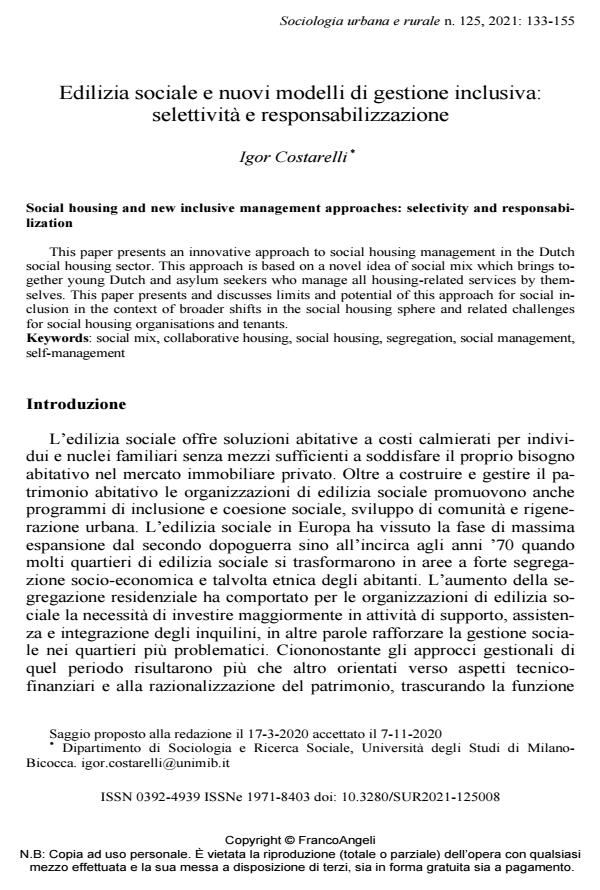Edilizia sociale e nuovi modelli di gestione inclusiva: selettività e responsabilizzazione
Titolo Rivista SOCIOLOGIA URBANA E RURALE
Autori/Curatori Igor Costarelli
Anno di pubblicazione 2021 Fascicolo 2021/125 Lingua Italiano
Numero pagine 23 P. 133-155 Dimensione file 397 KB
DOI 10.3280/SUR2021-125008
Il DOI è il codice a barre della proprietà intellettuale: per saperne di più
clicca qui
Qui sotto puoi vedere in anteprima la prima pagina di questo articolo.
Se questo articolo ti interessa, lo puoi acquistare (e scaricare in formato pdf) seguendo le facili indicazioni per acquistare il download credit. Acquista Download Credits per scaricare questo Articolo in formato PDF

FrancoAngeli è membro della Publishers International Linking Association, Inc (PILA)associazione indipendente e non profit per facilitare (attraverso i servizi tecnologici implementati da CrossRef.org) l’accesso degli studiosi ai contenuti digitali nelle pubblicazioni professionali e scientifiche
Il saggio prende in esame un nuovo modello di inclusione abitativa sperimentato in un progetto di edilizia sociale nei Paesi Bassi. Il progetto prevede un mix sociale fra giovani olandesi e giovani titolari di protezione internazionale e l’autogestione di tutti i servizi abitativi da parte degli stessi inquilini. Il saggio presenta e discute gli aspetti più innovativi di questo modello dal punto di vista dell’organizzazione che lo ha promosso e degli inquilini che fanno parte del progetto.;
Keywords:mix sociale, abitare collaborativo, edilizia sociale, segregazione, gestione sociale, autogestione.
- Bolt G., van Kempen R. (2013). Introduction Special Issue: Mixing Neighbourhoods: Suc-cess or Failure? Cities, 35: 391-396.
- Braga M., Palvarini P. (2013). Social Housing in the EU. Brussels: European Parliament - Directorate General for Internal Policies.
- Camina M.M., Wood M.J. (2009). Parallel Lives: Towards a Greater Understanding of What Mixed Communities Can Offer. Urban Studies, 46(2): 459-480. DOI: 10.1177/0042098008099363
- Costarelli I. (2020). La gestione dell’housing sociale. Archivio di Studi Urbani e Regionali, 127: 5-22.
- Czischke D., Pittini A. (2007) Housing Europe 2007. Review of social, co-operative and public housing in the 27 EU member states. Brussels: CECODHAS European Social Housing Observatory.
- Flint J. (2004). The Responsible Tenant: Housing Governance and the Politics of Behaviour. Housing Studies, 19(6): 893-909. DOI: 10.1080/0267303042000293991
- Flint J., Kearns A. (2006). Housing, Neighbourhood Renewal and Social Capital: The Case of Registered Social Landlords in Scotland. European Journal of Housing Policy, 6(1): 31-54. DOI: 10.1080/14616710600585716
- Franklin B., Clapham D. (1997). The Social Construction of Housing Management. Housing Studies, 12(1): 7-26. DOI: 10.1080/02673039708720880
- Graves E.M. (2011). Mixed outcome developments. Journal of the American Planning As-sociation, 77(2): 143-153. DOI: 10.1080/01944363.2011.567921
- Hansson A.G., Lundgren B. (2019). Defining Social Housing: A Discussion on the Suitable Cri-teria. Housing, Theory and Society, 36(2): 149-166. DOI: 10.1080/14036096.2018.1459826
- Haworth A., Manzi T. (1999). Managing the ‘Underclass’: Interpreting the Moral Discourse of Housing Management. Urban Studies, 36(1): 153-165. DOI: 10.1080/0042098993790
- Hoekstra J. (2017). Reregulation and Residualization in Dutch Social Housing: A Critical Evaluation of New Policies. Critical Housing Analysis, 4(1): 31-39. DOI: 10.13060/23362839.2017.4.1.322
- Kleinhans R., Priemus H., Engbersen G. (2007). Understanding Social Capital in Recently Restructured Urban Neighbourhoods: Two Case Studies in Rotterdam. Urban Studies, 44(5): 1069-1091. DOI: 10.1080/00420980701256047
- Lang R., Carriou C., Czischke D. (2020). Collaborative Housing Research (1990-2017): A Systematic Review and Thematic Analysis of the Field. Housing, Theory and Society, 37(1): 10-39. DOI: 10.1080/14036096.2018.1536077
- Lelévrier C. (2010). La mixité dans la rénovation urbaine: Dispersion ou re-concentration?. Espaces et Sociétés, 140-141: 59-74.
- Manzi T. (2010). Promoting Responsibility, Shaping Behaviour: Housing Management, Mixed Communities and the Construction of Citizenship. Housing Studies, 25(1): 5-19. DOI: 10.1080/02673030903363462
- Musterd S. (2005). Social and ethnic segregation in Europe: Levels, causes, and effects. Journal of Urban Affairs, 27(3): 331-348.
- Musterd S., Van Kempen R. (2009). Segregation and housing of minority ethnic groups in western European cities. Tijdschrift voor Economische en Sociale Geografie, 100(4): 559-566.
- Priemus H. (2013). The Future of Social Housing. The Dutch Case. International Journal of Co-operative Management, 6(2): 13-24.
- Priemus H., Dieleman F., Clapham D. (1999). Current Developments in Social Housing Management. Netherlands Journal of Housing and the Built Environment, 14(3): 211-223. DOI: 10.1007/BF02496678
- Saugeres L. (1999). The Social Construction of Housing Management Discourse: Objectivi-ty, Rationality and Everyday Practice. Housing, Theory and Society, 16(3): 93-105. DOI: 10.1080/14036099950149965
- Scanlon K., Whitehead C., Fernández Arrigoitia M. (2014). Social Housing in Europe. Ox-ford: RICS Research.
- Tammaru T., Van Ham M., Marcinczak S., Musterd S. (eds.) (2015). Socioeconomic segre-gation in European capital cities: East meets West. London: Routledge. Tersteeg A.K., Pinkster F.M. (2016). ‘Us Up Here and Them Down There’: How Design, Man-agement, and Neighborhood Facilities Shape Social Distance in a Mixed-Tenure Housing Development. Urban Affairs Review, 52(5): 751-779. DOI: 10.1177/1078087415601221
- Tunstall R., Fenton A. (2006). In the Mix. A Review of Mixed Income, Mixed Tenure, Mixed Communities: What Do We Know?. York: Housing Corporation, Joseph Rowntree Foundation, English Partnerships.
- Uitermark J. (2003). ‘Social Mixing’ and the Management of Disadvantaged Neighbour-hoods: The Dutch Policy of Urban Restructuring Revisited. Urban Studies, 40(3): 531-549. DOI: 10.1080/0042098032000053905
- Van Kempen R., Bolt G. (2009). Social cohesion, social mix, and urban policies in the Netherlands. Journal of Housing and the Built Environment, 24(4): 457-475.
- Van Kempen R., Özüekren A.S. (1998). Ethnic segregation in cities: new forms and explanations in a dynamic world. Urban Studies, 35(10): 1631-1656. DOI: 10.1080/0042098984088
- Walker R. (2000). The Changing Management of Social Housing: The Impact of Externalisation and Managerialisation. Housing Studies, 15(2): 281-299. DOI: 10.1080/02673030082397
Igor Costarelli, Edilizia sociale e nuovi modelli di gestione inclusiva: selettività e responsabilizzazione in "SOCIOLOGIA URBANA E RURALE" 125/2021, pp 133-155, DOI: 10.3280/SUR2021-125008